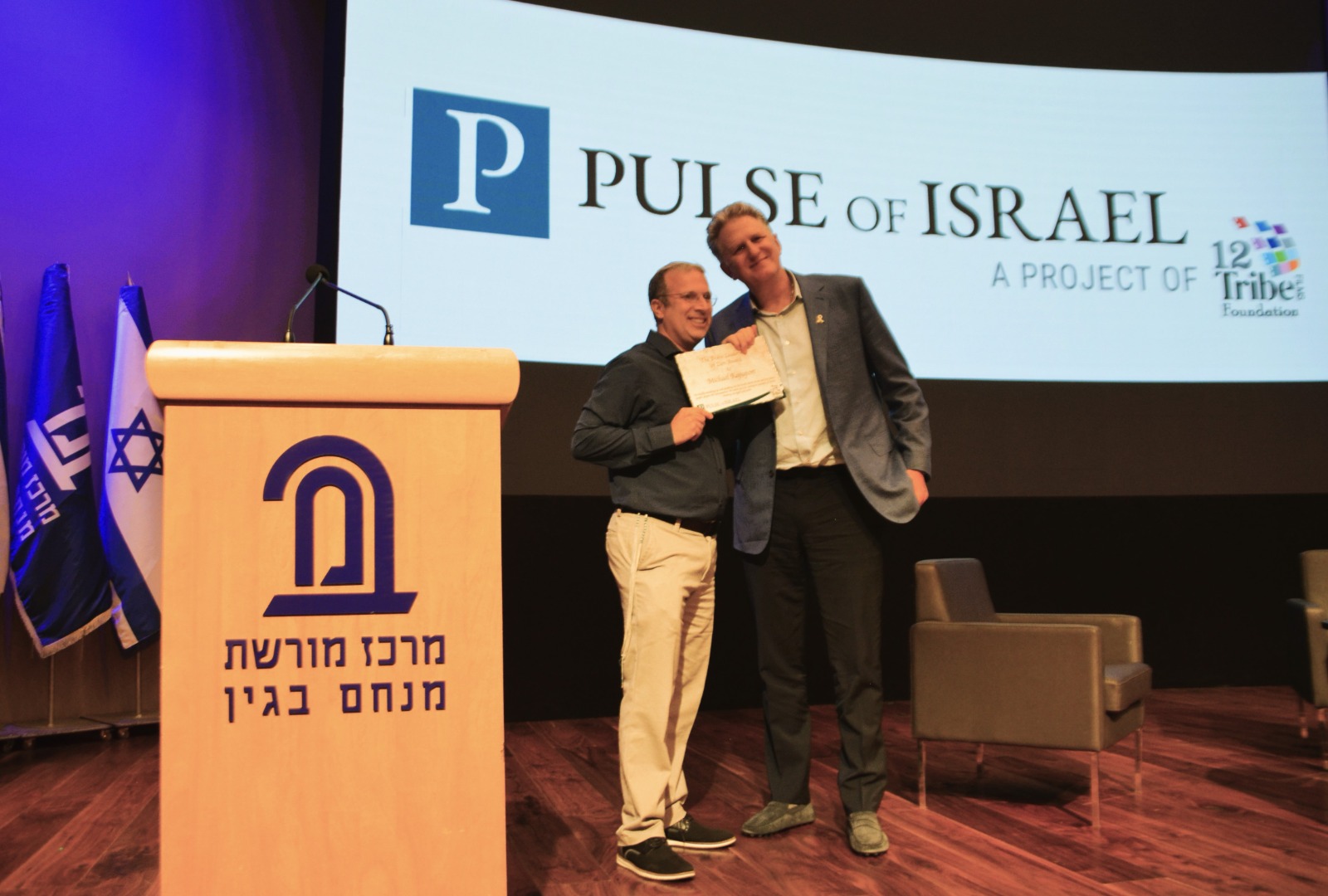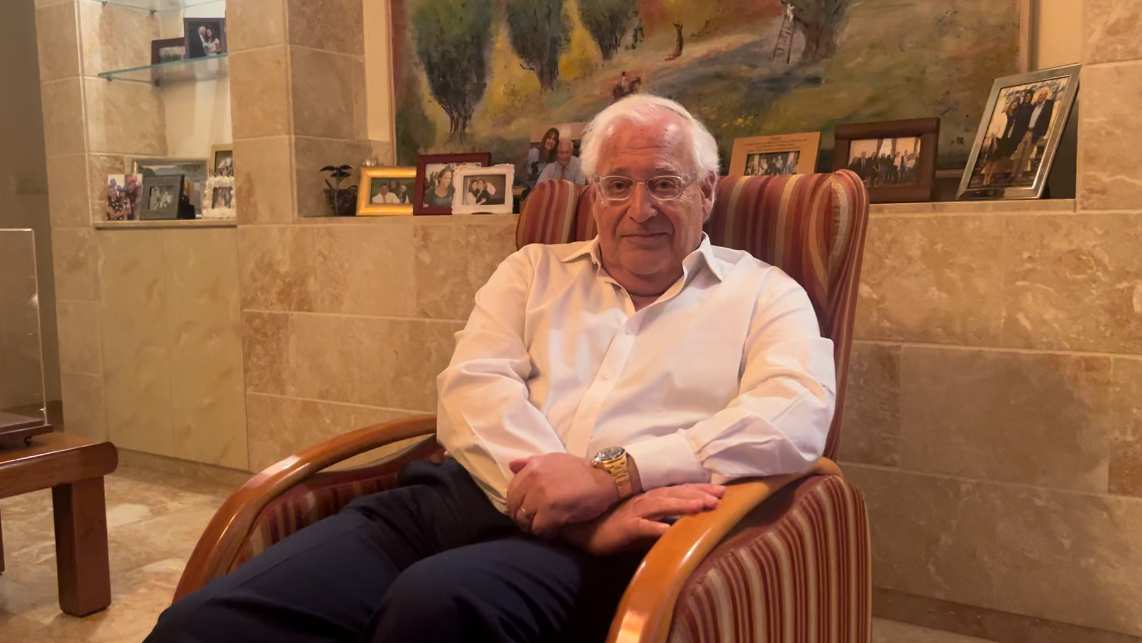Could a One Jewish State Plan Secure Israel’s Future?
With multifront war ongoing, novel approaches to peace with Palestinians are emerging
Israel is facing a significant escalation in the ongoing war as Iran and its proxies threaten the nation. As Israel targets Hamas leaders and considers establishing a civil administration in Gaza run by local clans, diplomats and thought leaders are developing strategies to ensure that Israel does not face another crisis like October 7.
In February, former US Ambassador to Israel David Friedman introduced the first draft of a one-state plan for Israel and the territories, and last month, he presented the idea to lawmakers in the Knesset. The plan will be detailed in his upcoming book, One Jewish State: The Last, Best Hope to Resolve the Israeli-Palestinian Conflict, which is set to be published on September 3.
Friedman served as ambassador under President Donald Trump. He told The Media Line that he has not yet shared all the details with Trump but will likely try to work with Trump on the plan if he is reelected.
You have two choices: You can try to kill us. We’re not going to let you do that. We’re certainly going to win that fight. If you don’t want to kill us, do you want to live with us? We will bend over backward to try to bring your lives up to standard.
Friedman’s plan is meant to send a message to the Palestinians, which he described as follows: “You have two choices: You can try to kill us. We’re not going to let you do that. We’re certainly going to win that fight. If you don’t want to kill us, do you want to live with us? We will bend over backward to try to bring your lives up to standard.”
In essence, the plan proposes extending Israeli sovereignty over all of the West Bank, known by religious Jews as Judea and Samaria, and granting permanent residency to the 2.7 million or so Palestinians living there. It also seeks American and Gulf support for a “Marshall Plan” to improve the region’s health care, education, and overall prosperity.
Friedman said the plan aligns with biblical covenants, addresses security concerns, and promotes human dignity for everyone. It aims to maximize Palestinian self-governance and prosperity while ensuring Israel’s security.
It is not right-wing or left-wing; it is about the best outcome for the most people
“It is not right-wing or left-wing; it is about the best outcome for the most people,” Friedman said.
Friedman said his plan crystallized after October 7, when he concluded that the two-state solution was no longer viable. Instead, he believes Israel needs a strategy that balances its right to exist in peace and security with Jewish self-determination while ensuring fundamental human rights for everyone who lives in the country, including Palestinians.
According to Friedman’s plan, Israel would assert sovereignty over the West Bank, provide care for Palestinians, and empower them with local self-rule. Palestinians in these areas, who currently lack Israeli citizenship, would receive it – including Israeli documents. Still, they would only vote in local elections, not national ones, to maintain Israel’s Jewish character and leadership.
“There are more than 50 Muslim nations around the world. There are Christian nations, as well as Buddhist and Hindu nations. We are talking about one Jewish state,” Friedman told The Media Line.
Friedman compared the situation to American territories like Samoa, Guam, Puerto Rico, and the US Virgin Islands, where residents are American citizens but cannot elect a US president and have nonvoting congressional representation.
“These arrangements are accepted because of significant reciprocal benefits,” Friedman said. “Israel has to help the Palestinians get out from the depths.”
He emphasized that his plan cannot be considered apartheid. Unlike in racist South Africa where black residents were forcibly removed from their homes and placed in poor living conditions, Friedman’s plan ensures Palestinians permanent residency in their homes and promises significant improvements in infrastructure, health care, education, and overall prosperity.
Friedman acknowledged that the plan is “largely aspirational” at this stage but hopes it will “change the trajectory of how we think about this region.”
He pointed out that millions of Christians worldwide believe Israel is the land of the Bible and that God made a covenant with the Jewish people to live there. “The more that Israel punts” on annexing the biblical heartland of Judea and Samaria, he said, “the harder it is for the country to be taken seriously about its desire to have sovereignty over all of God’s land.”
Give the gift of hope
We practice what we preach:
accurate, fearless journalism. But we can't do it alone.
- On the ground in Gaza, Syria, Israel, Egypt, Pakistan, and more
- Our program trained more than 100 journalists
- Calling out fake news and reporting real facts
- On the ground in Gaza, Syria, Israel, Egypt, Pakistan, and more
- Our program trained more than 100 journalists
- Calling out fake news and reporting real facts
Join us.
Support The Media Line. Save democracy.
Friedman emphasized that while Israel would maintain sovereignty over sacred sites in these areas, they would remain open and protected for people of all faiths.
Friedman clarified that this plan might not be for immediate implementation but could probably roll out within the next five years. First, he said, Israel needs to secure internal support and backing from the United States, which he believes is achievable under Trump.
He explained that previous plans aimed to keep Area C of the West Bank for Israel and hand over Areas A and B to the Palestinians.
“But if Areas A and B remain isolated from Israel, they will just turn into Gaza and perpetuate the conflict,” Friedman said. He noted that these are places where no Jews live and there is no Israeli military presence, which creates a bubble in which terrorism flourishes.
“These are painful lessons we learned on October 7. … Gaza was the test case for a Palestinian state, and it failed,” he continued. “This [Friedman’s plan] would be the test case for sovereignty, and we hope it succeeds.”
Voice of the Pulse of Israel Plan
Friedman is not the only one developing a new one-state solution to the conflict.
Avi Abelow, CEO of Voice of the Pulse of Israel, presented his five-point plan for a bright Israeli future to a packed room of hundreds of people at the Menachem Begin Heritage Center in June.

Pulse of Israel CEO Avi Abelow (left) presents actor Michael Rapaport with the Brave Leadership of Zion Award at a Pulse of Israel conference at the Menachem Begin Heritage Center in Jerusalem, June 30, 2024. (Sharon Altshul)
Abelow’s plan calls for Israel to win the current war by uprooting terrorists and their infrastructure from Gaza, Judea, Samaria, and Lebanon. Following this, Israel would apply sovereignty over Gaza, Judea, and Samaria. The plan suggests that the army return to Lebanon’s Northern Security Zone.
The plan has three additional points:
Israel will grant citizenship to all Arabs living in Judea, Samaria, and Gaza who pledge allegiance to the state. Those who wish to live in peace and enjoy the blessings of full democracy and freedom for all Arab Muslims in Israel will be welcome to enjoy full rights. Anyone connected to terror or supporting the destruction of the Jewish state will be encouraged to live elsewhere.
Israel will assist any Arab Muslims in Judea, Samaria, and Gaza who do not pledge allegiance to the state or who call for the murder and destruction of Jews in emigrating to other countries.
Finally, Israel will take control of the Temple Mount. Abelow asserts that Israel must stop tolerating intolerance. This move is critical in sending a message to the Muslim world and the entire international community that Israel is permanent, democratic, sovereign, solid, and open to anyone from any faith or background who chooses a life of tolerance and peace.
Abelow told The Media Line that he believes most Palestinians will choose to emigrate from Israel, so granting citizenship to Arabs in Judea, Samaria, and Gaza would not pose a demographic threat to Israel.
Like Friedman, Abelow does not have a detailed implementation plan, leaving that to officials who might adopt it. Abelow emphasized the importance of the country, making it clear that “having people that want to kill us amongst us is unacceptable.”
Abelow acknowledged that initially, the world might object to applying sovereignty in Gaza, Judea, and Samaria, as well as encouraging Arabs who don’t support Israel to relocate. However, he believes that in the long term, this approach will gain international support.
“In the long-term, this will inspire other freedom-loving countries,” Abelow told The Media Line. He argued that with extremist Muslims taking over in parts of Europe and the United States, it is in the interest of all Western countries to take similar actions.
Shortly after the October 7 massacre, Trump said at a rally that if he were elected president again, he would bar immigrants who support Hamas from entering the US and send officers to pro-Hamas protests to arrest and deport immigrants who publicly support the terrorist group.
‘Not Time for Aggressive Expansion’
However, Len Khodorkovsky strongly disagreed with this expansionist premise. A former senior adviser to the US special representative for Iran, Khodorkovsky, told The Media Line that “Israel is not in a position to act unilaterally and expect everyone to fall in line. The wise thing would be to be pragmatic and achieve the country’s security objectives so that no Israeli citizen is threatened.”
He said that he did not believe Israel’s neighbors, including its Abraham Accords allies, would respond kindly to what he referred to as “aggressive expansion.”
I don’t even think the Israeli people agree that this is the way to go. … I believe the real threat Israel faces is internal division.
“I don’t even think the Israeli people agree that this is the way to go,” Khodorkovsky said. “It needs to be decided democratically how to proceed. … If Israel is not aligned internally, like before October 7, I don’t think that is ultimately good for Israel. I believe the real threat Israel faces is internal division.”
Brig. Gen. (res.) Amir Avivi, the founder and CEO of the Israel Defense and Security Forum, said that winning the war needed to come before anything else. On this issue, the former general said that he agreed with Abelow: It means rooting out terrorism from Israel’s borders and likely continuing to have at least a military presence in Gaza, the Lebanon security zone, and the West Bank.
“We need to set the terms to bring back all the citizens to a safe environment,” Avivi said.
However, he emphasized that the core issue is not just the Iranian proxies on the border but Iran itself, which he believes must be addressed sooner rather than later for Israel to thrive again.
The best thing we can do is ensure that the next administration understands the urgency of dealing with Iran militarily and destroying their nuclear program
“The best thing we can do is ensure that the next administration understands the urgency of dealing with Iran militarily and destroying their nuclear program,” Avivi told The Media Line. “This is an existential threat for Israel.”
Regarding sovereignty over the West Bank, Avivi supports it. However, he believes that citizenship should not be granted to Palestinians who remain in the area. Given the challenging conditions in neighboring Muslim countries, he does not expect many Palestinians granted citizenship to give it up and emigrate.
“For a nation that has been expelled from its land four times and has faced endless wars since returning to Israel, it is crucial to address the question of how to secure Israel for future generations seriously,” Avivi said. “That is what is needed. Once we answer that question, we can consider how to handle the Palestinians.”



